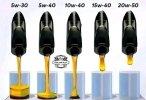Zip iget 50cc Utrecht
Beginnende sleutelaar
Understanding Engine Oil Viscosities: A Visual Guide
If you've ever wondered about the different types of engine oil and what those strange numbers and letters mean, you're not alone. Engine oil is a vital component of your vehicle, and choosing the right type is crucial for its performance and longevity. In this blog post, we'll break down the basics of engine oil viscosities using a visual guide.
What is Engine Oil Viscosity?
Viscosity refers to the thickness or thinness of a liquid. In the context of engine oil, it's how easily the oil flows at different temperatures. This is important because your engine experiences a wide range of temperatures, from freezing cold on a winter morning to extremely hot under heavy load.
The Numbers in Engine Oil Grades
Engine oil grades are typically expressed as two numbers separated by a "W," such as 5W-30 or 10W-40. Let's break down what these numbers mean:
* The First Number (Before the W): This number indicates the oil's cold-temperature performance. A lower number means the oil flows more easily in cold weather, allowing for quicker lubrication and easier starting.
* The Second Number (After the W): This number represents the oil's high-temperature performance. A higher number means the oil can withstand higher temperatures without breaking down, providing better protection for your engine under heavy load.
The Visual Guide
The image you provided illustrates the concept of viscosity in a clear and concise way. It shows five different engine oil grades: 5W-30, 5W-40, 10W-40, 15W-40, and 20W-50. As you can see, the oil with the lower first number (5W-30) flows more easily at colder temperatures, while the oil with the higher second number (20W-50) maintains its thickness at higher temperatures.
Choosing the Right Engine Oil
The best engine oil for your vehicle will depend on several factors, including:
* Climate: If you live in an area with extreme cold or heat, you'll need to choose an oil that can handle those conditions.
* Driving Conditions: If you frequently drive in stop-and-go traffic or tow heavy loads, you'll need an oil that can withstand high temperatures and prevent oil breakdown.
* Vehicle Manufacturer's Recommendations: Always consult your vehicle's owner's manual for the recommended oil type and viscosity.
By understanding engine oil viscosities and following the recommendations of your vehicle's manufacturer, you can ensure that your engine is properly lubricated and protected, extending its lifespan and improving its performance.
If you've ever wondered about the different types of engine oil and what those strange numbers and letters mean, you're not alone. Engine oil is a vital component of your vehicle, and choosing the right type is crucial for its performance and longevity. In this blog post, we'll break down the basics of engine oil viscosities using a visual guide.
What is Engine Oil Viscosity?
Viscosity refers to the thickness or thinness of a liquid. In the context of engine oil, it's how easily the oil flows at different temperatures. This is important because your engine experiences a wide range of temperatures, from freezing cold on a winter morning to extremely hot under heavy load.
The Numbers in Engine Oil Grades
Engine oil grades are typically expressed as two numbers separated by a "W," such as 5W-30 or 10W-40. Let's break down what these numbers mean:
* The First Number (Before the W): This number indicates the oil's cold-temperature performance. A lower number means the oil flows more easily in cold weather, allowing for quicker lubrication and easier starting.
* The Second Number (After the W): This number represents the oil's high-temperature performance. A higher number means the oil can withstand higher temperatures without breaking down, providing better protection for your engine under heavy load.
The Visual Guide
The image you provided illustrates the concept of viscosity in a clear and concise way. It shows five different engine oil grades: 5W-30, 5W-40, 10W-40, 15W-40, and 20W-50. As you can see, the oil with the lower first number (5W-30) flows more easily at colder temperatures, while the oil with the higher second number (20W-50) maintains its thickness at higher temperatures.
Choosing the Right Engine Oil
The best engine oil for your vehicle will depend on several factors, including:
* Climate: If you live in an area with extreme cold or heat, you'll need to choose an oil that can handle those conditions.
* Driving Conditions: If you frequently drive in stop-and-go traffic or tow heavy loads, you'll need an oil that can withstand high temperatures and prevent oil breakdown.
* Vehicle Manufacturer's Recommendations: Always consult your vehicle's owner's manual for the recommended oil type and viscosity.
By understanding engine oil viscosities and following the recommendations of your vehicle's manufacturer, you can ensure that your engine is properly lubricated and protected, extending its lifespan and improving its performance.

